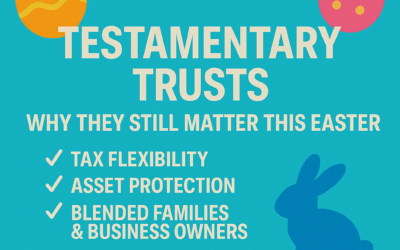Ensuring Your Wishes Are Honored
Creating a Will to Secure your Families Future
One of the fundamental aspects of estate planning is understanding how wills and testamentary trusts function.
Let’s explore these concepts in detail:
- A will, often referred to as a last will and testament, is a legal document that outlines your wishes regarding the distribution of your assets and the care of any minor children after your death. Here’s how wills work
- Asset Distribution: Your will specifies how you want your property, investments, and personal belongings to be distributed among your beneficiaries.


- Executor: You appoint an executor in your will, who is responsible for carrying out your wishes as outlined in the document. This includes gathering your assets, paying any debts, and distributing property to beneficiaries.
- Guardianship: If you have minor children, your will can nominate guardians to care for them in the event of your death.
- Legal Requirements: Wills must meet certain legal requirements to be valid, including being in writing, signed by you (the testator), and witnessed by others who are not beneficiaries.
- Having a clear and legally sound will is crucial to ensuring that your estate is distributed according to your wishes, providing peace of mind for you and security for your loved ones.
Testamentary Trusts: preserving your legacy
- A testamentary trust is a trust that is established according to the terms of a will and comes into effect after the death of the person making the will (the testator). Here are key points about testamentary trusts:
- Purpose: Testamentary trusts are often used to manage assets for beneficiaries who may be minors, financially inexperienced, or who require ongoing support.
- Flexibility: They can be highly flexible, allowing you to specify conditions under which assets are distributed, such as reaching a certain age or achieving specific milestones.
- Tax Efficiency: Testamentary trusts can offer tax benefits, such as potential income splitting among beneficiaries, which may lead to reduced overall tax liabilities.
- Trustee: A trustee is appointed to manage the trust assets and administer them according to the terms set out in the will. This can be a person or a corporate trustee.
By establishing a testamentary trust, you can ensure that your assets are managed and distributed in a manner that aligns with your intentions and provides ongoing support and protection for your beneficiaries.
Consulting with Our Estate Planning Experts
At KALDE LEGAL, we understand that estate planning can be complex, and every individual’s situation is unique. We are here to guide you through the process of drafting a will and establishing testamentary trusts tailored to your specific needs and goals.
Contact us today to schedule a consultation and take the first step toward securing your legacy and protecting your loved ones’ future.

Contact Us
The Sneaky Lease Clause That Could Have Cost My Client Everything
The Sneaky Lease Clause That Could Have Cost My Client Everything Not long ago, I advised a client who was looking to purchase a local business. Everything seemed straightforward: the Contract of Sale included a lease with a year left to run, plus two further options...
3 Costly Mistakes New Business Owners Make After a Purchase
The 3 Biggest Mistakes People Make After Buying a Business So you’ve bought a business–congratulations! After months of research, negotiation, andlegals, the deal is finally done. But the work doesn’t stop there. The decisions you make inthe earlydays of ownership can...
Attention: Gen Xer
“If you’re a Gen Xer like me, chances are your parents are Baby Boomers — and many of them are now divorced, remarried, and part of blended families. But what happens to the will when there are step-siblings and second spouses in the mix?” So many families torn...
Have You Updated Your Will to Include Digital Assets?
In today’s world, our lives are increasingly lived online. From social media profiles and online banking to cloud storage and cryptocurrency, digital assets now form a significant part of our personal and financial footprint. But here’s the question: Have you updated...
Commercial Leasing for Landlords: Protect Your Investment
Commercial Leasing for LandlordsProtect your investment and maximise your returns with expert legal support. Challenges Landlords Face Owning a commercial property can be a valuable asset—but without the right legal protections in place, it can quickly become a...
Shopping Centre Leases – What to Look out For
Signing a lease for premises in a shopping centre is different to other kinds of commercial leases. Be very careful before stepping into treacherous terrain. Here are a few features that are found in shopping centre leases that do not exist anywhere else: Turnover...
Plan Today, Protect Tomorrow – Download Your Free Estate Planning Book Now
When it comes to looking after your family, there’s no greater peace of mind than knowing their future is secure — no matter what happens. That’s exactly what a solid estate plan can offer. Yet for many Australians, thinking about wills and estate planning feels...
Why Updating Your Will After Retirement is a Smart Move
Why Updating Your Will After Retirement Is a Smart Move Retirement is a major milestone – a time to slow down, reflect on your journey, and enjoy the rewards of your hard work. It's also the perfect time to revisit your estate planning, especially your will. Many...
How Parents Can Safely Lend Money to Children to Buy a House
Avoid losing your loan in divorce or bankruptcy: Legal tips from a commercial lawyer As house prices soar, many Australian parents are stepping in to help their adult children buy their first home. The “Bank of Mum and Dad” has become Australia’s 10th largest...
Thinking of Buying Real Estate? Here’s What You Need to Know
Thinking of Buying Real Estate? Here's What You Need to Know Investing in real estate can be rewarding, but it's essential to approach the process with caution and knowledge. Missteps in property purchases can lead to significant financial setbacks. Key...
Your Legacy Starts Here
Take a Look Inside the Will Creation Process – Only at Kalde Legal What Does It Take to Make a Will? Know what you own Decide who gets what Take action No stress. No drama. Just peace of mind. Most people wait too long. Don’t be one of them. It only takes minutes...
Unlocking the TruValue of Your Business
Unlocking the True Value of Your Business: Why a Professional Business Appraisal is Essential If you’re selling your business, one of the most important steps you can take is understanding its true value. If you’ve built a business over years of hard work and you’re...
Business Appraisal is Essential
Unlocking the True Value of Your Business: Why a Professional Business Appraisal is Essential If you’re selling your business, one of the most important steps you can take is understanding its true value. If you’ve built a business over years of hard work and you’re...
Loaning Money to Family Members: Why You Should Protect Yourself
Loaning Money to Family Members: Why You Should Protect Yourself It’s natural to want to help a loved one in a time of need. Whether it's a child trying to buy their first home, a sibling going through a rough patch, or older parents requiring financial support,...
Testamentary Trusts – Why They Still Matter in 2025
As family structures, tax laws, and asset protection needs continue to evolve, testamentary trusts remain one of the most effective tools in estate planning. Here’s why they’re still front and centre in 2025: ✅ Tax Flexibility – Income can be distributed to...
Is a Will really enough to protect your family?
When it comes to planning your estate, one question can make all the difference: “Should I just make a Will… or consider a Testamentary Trust?” Here’s the simple truth: A Will is great for basic asset distribution. A Testamentary Trust gives your family ongoing...
Did You Know? Your Brand Could Be at Risk Without a Trademark!
A trademark is one of the most valuable assets a business can own. It distinguishes your brand from competitors, builds customer trust, and safeguards your reputation. Whether you’re a startup or an established company, securing a trademark is a crucial step in...
Organising Your Estate Planning Matters with Kalde Legal
Estate Planning Expert Organising Your Estate Planning Matters with Kalde Legal Estate planning is one of the most important steps you can take to ensure your assets are distributed according to your wishes and that your loved ones are cared for. At Kalde Legal, we...
Why Blended Families Face Higher Risks of Will Disputes
Why Blended Families Face Higher Risks of Will Disputes Blended families, which often consist of parents who have remarried and their children from previous relationships, are becoming increasingly common. While these families bring together diverse relationships and...
Contesting a Will?
Contesting a Will: What You Need to Know Losing a loved one is always difficult, but discovering that you have been left out of their will can make the situation even more challenging. If you believe you have been unfairly excluded or have not received adequate...







